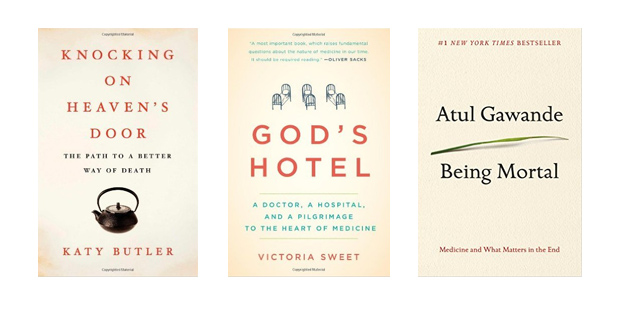American Healthcare
Sometimes families facing a health crisis feel as if medical care is as unstoppable and uncontrollable as a freight train with someone else at the wheel. There is plenty to worry about in the American healthcare system — out-of-control costs, screening tests under fire, medical research studies hijacked by for-profit pharma. But wait. Here are 3 books that will give you insight and hope for how medical care can enhance your quality of life. Or not.
God’s Hotel: A Doctor, a Hospital and a Pilgrimage to the Heart of Medicine, by Victoria Sweet
Sweet wanted to practice medicine but also wanted to learn about pre-modern medicine. How fortuitous, then, that Sweet ended up working at Laguna Honda Hospital in San Francisco. Known as “America’s last almshouse,” the facility had no MRI machine or CT scanner. The homeless and the poor arrived after being released by more sophisticated hospitals. Here, the poor could stay months or even years.
You’ve heard of slow medicine? What Sweet describes is snail’s-pace medicine. Doctors spent 3 hours on intake examinations using stethoscopes, an X-ray machine and their eyes as their primary tools. Sweet turned patients’ medical histories into lively stories of people whose bodies were worn down by poor nutrition, drug or alcohol abuse, and lack of medical care. Given sunlight, good food and time, many of these near hopeless cases were turned around. Life, as described by Sweet, is tenacious and patient. It will re-bloom even in a badly compromised body.
This book is written at a leisurely pace that never seems slow. And it sneaks in some teaching about pre-modern medicine in Europe — some of which can be applied today. Really.
Knocking on Heaven’s Door: The Path to a Better Way of Death, by Katy Butler
Butler intersperses the story of her father’s slow-motion avalanche of body failures and medical interventions with insightful, well-researched essays on the business of keeping people alive at any cost. Butler’s father was determined to recover from a crippling stroke, then a pacemaker kept his failing heart moving. But as he slid into dementia and misery Butler’s father, her mother and Butler herself started asking the question, when is it enough?
In many cases our medical system can keep a person alive far longer than nature or God seemed to intend. Family members watch a patriarch or matriarch who had always made clear their intentions to avoid heroic medical care be propped up and pushed on with incremental care. Too soon after, Butler’s mother used the lessons they’d learned to make her own life and death health decisions.
Most of us will be faced with the same options, either on behalf of a family member or ourselves. Much as one doesn’t like to think about it, this serves as a cautionary tale. The lesson? After a certain age, consider carefully how the care you are offered will affect your ability to control your destiny.
Being Mortal: Medicine and What Matters in the End, by Atul Gawande
How to summarize a book by one of the best doctor-writers of our time? Let him do it:
The first half of the book focuses on aging — as the author says, what makes life worth living. It then turns to the “hard conversations” of difficult choices. Not all operations or medicines will cure a patient, they might only keep the patient going a while longer. The patient has the right, according to Gawande, to fully understand what the possible outcomes are and to determine for her/himself what s/he can live with and where to draw the line. By including the story of his own fiercely independent father’s diagnosis of a fatal disease and the clear-sighted decisions he made, Gawande shares what he learned.






